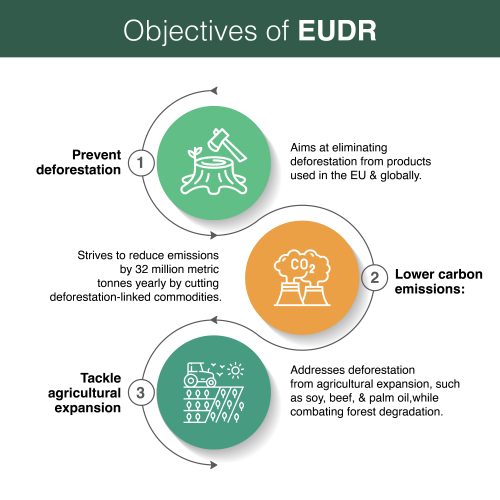A background on global environmental challenges:
Climate change and environmental deterioration pose a fundamental threat to Europe and the entire world. The environment plays a pivotal role in enriching our society’s health and overall quality of life. This environment is currently grappling with a host of significant challenges, including climate change, unsustainable consumption and production patterns, biodiversity loss, natural resource degradation, and CO2 emissions hampering the livelihood of people depending on them. The Intergovernmental Panel on Climate Change (IPCC) findings denote that deforestation and the deterioration of forests are primary drivers of climate change and the decline in biodiversity. They are responsible for roughly 11% of the overall greenhouse gas emissions.
EU's international stance on climate action:
The EU is actively combating climate change and environmental decline by enacting robust domestic policies and fostering strong collaborations with global allies. As a prominent participant in climate negotiations, the EU aims at the development and execution of climate policies and strategies. The EU is firmly committed to enforcing the Paris Agreement and maintaining the EU emissions trading system.
Deforestation as a menacing threat to climate change:
Between 2015 and 2017, the EU’s annual consumption of palm oil, soybeans, forest products, cocoa, and coffee led to deforestation spanning 190,000 hectares yearly. The European Union (EU), recognizing its significance as a substantial consumer market, expresses deep concern and calls for decisive measures. “As a major consumer market, the EU bears significant responsibility, which is why it has recently enacted the EU Regulation against deforestation. This regulation introduces stringent due diligence and traceability requirements, applicable universally to all relevant products,” noted Mrs Florika Fink-Hooijer, Director-General of the Environment Department at the European Commission.
A new supply chain sustainability legislation that carries on the trend of including responsible sourcing methods into compliance specifications is the European Union Deforestation Legislation (EUDR).
Significance of EUDR:
On June 29, 2023, the European Union Deforestation-free Regulation (EUDR) entered into force. The Regulation primarily aims to encourage the use of products without links to deforestation or forest deterioration. The EU seeks to curtail its contribution to worldwide deforestation and decrease greenhouse gas emissions through this effort. This action is part of a broader strategy outlined in the 2019 Commission Communication for strengthening EU measures to protect and regenerate global forests, a strategy further endorsed by the European Green Deal, the EU Biodiversity Strategy for 2030, and the Farm to Fork Strategy.
The EUDR has three main objectives:
Prevent deforestation: The EUDR aims to eliminate deforestation from products used in the EU and globally.
Lower carbon emissions: By cutting deforestation-linked commodities, it strives to reduce emissions by 32 million metric tonnes yearly.
Tackle agricultural expansion: It addresses deforestation from ag expansion, such as soy, beef, and palm oil, while combating forest degradation.

How can traceability help connect the dots for compliance?
While adhering to the EUDR might be difficult and time-consuming, failing to do so may result in product confiscation or delayed product release. Companies frequently don’t have transparency in their whole supply chain. Traceability plays a pivotal role in the battle against deforestation, offering a multifaceted approach to sustainable sourcing. By providing insight into the origins of products, it enables consumers and companies to make informed choices. Additionally, it caters to supply chain visibility, allowing for the identification of deforestation-prone regions and the implementation of targeted mitigation measures. The aggregation of data for risk analysis equips businesses with valuable tools to address vulnerabilities and align with green initiatives, fostering Corporate Social Responsibility (CSR).
Navigating EUDR compliance with RightOrigins:
The implementation of EUDR marks a significant step in a crucial industry transformation aimed at achieving transparency and sustainability. With our blockchain-powered traceability technology, RightOrigins, you can comply with EUDR regulations because it gathers authenticated data at every stage, from the final product to the land plot. Companies can better arrange data for supply chain visibility, enhance their sustainability credentials, and contribute to a more sustainable future by protecting smallholders’ livelihoods by adhering to the EUDR.
Conclusion
The European Union’s Deforestation-Free Regulation represents a pioneering effort to tackle deforestation and foster sustainability and ethical conduct among EU-based businesses. It ensures compliance with diverse market and buyer requirements, such as preventing deforestation, reducing emissions, and protecting smallholders’ livelihoods. Utilising our Supply Chain Traceability and ESG Intelligence suite, RightOrigins, your company can confidently achieve EUDR compliance and contribute to safeguarding both people and the planet. As organisations increasingly adopt traceability, they pave the way for a transition towards a more sustainable economy, where the planet’s health goes hand in hand with business success.
